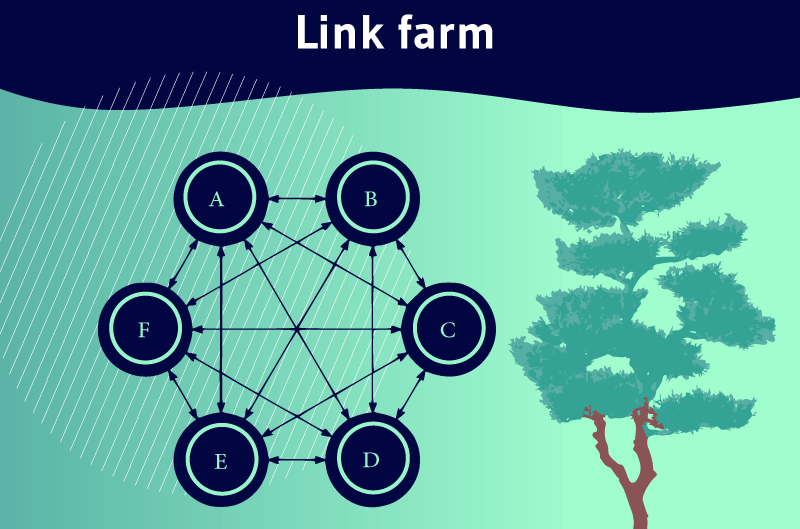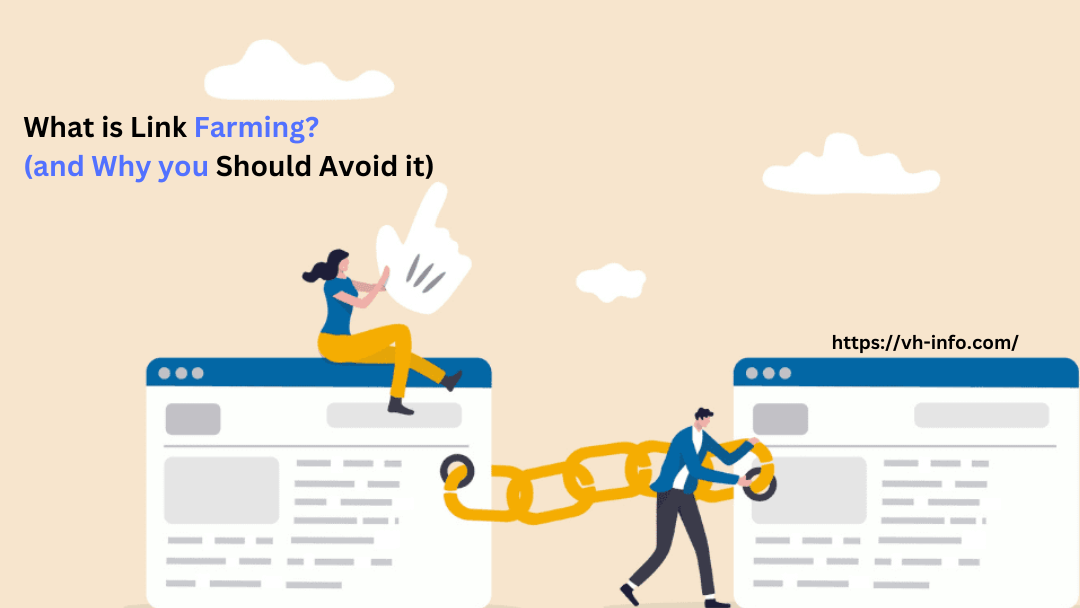Unravel the mystery of link farms: Are they actually beneficial for SEO, or are they just a shady strategy?

Image courtesy of via DALL-E 3
Table of Contents
Welcome, young learners! Today, we’re going to dive into the exciting world of link farms. But don’t worry if you’re not sure what that means just yet. We’re going to break it down into simple terms that will help you understand why knowing about link farms can be really important when you’re creating content online. So, let’s get started!
What You’ll Learn
In this article, we’ll cover everything you need to know about link farms. You’ll learn what they are, why they matter, and most importantly, how to avoid them. By the end, you’ll be equipped with the knowledge to navigate the online world more safely and effectively. So, let’s begin our journey into the world of link farms!
What is a Link Farm?
Have you ever heard of a link farm? Let’s break it down in a simple way. A link farm is like a group of websites that all link to each other to try to look important to search engines.
Simple Definition
Picture a group of friends who keep complimenting each other over and over again to seem popular. That’s what a link farm does with websites – they keep linking to each other to try to trick search engines into thinking they’re popular and important.
Why It Exists
People create link farms because they want their websites to show up higher in search results. They think that if their website has tons of links from other sites, search engines will think it’s super useful and boost it to the top. But, that’s not the right way to go about it!
Why Link Farms are Bad
Link farms might sound like a good idea at first, but in reality, they can cause more harm than good. Let’s delve into why link farms are not a smart move when it comes to creating content online.
Search Engine Rules
Search engines like Google have strict rules against using link farms. These rules are in place to ensure that websites are ranked based on their quality and relevance, rather than just the number of links they have. When a website is caught using a link farm, it can face penalties that can severely impact its visibility in search results.
Penalties for Using Link Farms
One of the most significant consequences of using link farms is the risk of being penalized by search engines. Websites that are found to be involved in link farming can experience a drastic drop in their search rankings. This means that all the hard work put into creating content and building an online presence can go to waste if caught using these prohibited tactics.
How to Spot a Link Farm
Link farms can be harmful to websites and their search engine rankings. Here’s how you can identify them:

Image courtesy of www.twaino.com via Google Images
Common Signs
One common sign of a link farm is a website with a large number of links that seem irrelevant or low-quality. If a website has an unusually high number of outbound links pointing to unrelated websites, it may be a part of a link farm. Additionally, if the content on the website is of poor quality and exists solely to host links, it could be a red flag.
Examples of Link Farms
Imagine a scenario where you come across a website that has a long list of links, all leading to various other websites that have no apparent connection. This kind of link network can often indicate a link farm. Another example could be a website that offers to sell links in bulk, promising to boost your site’s ranking quickly and significantly. These are telltale signs of a link farm operation.
Good Link Practices
When it comes to creating links for your website, it’s important to do it the right way. Good link practices can help your site rank higher on search engines and attract more visitors. Here are some tips on how to create good, fair links for your website.
Earning Links Naturally
One of the best ways to get quality links to your site is by earning them naturally. This means creating high-quality content that other people find valuable and want to link to. When you produce engaging and useful content, other websites are more likely to link back to your site, boosting your SEO.
Asking for Links the Right Way
If you want to ask other websites to link to your content, make sure you do it politely and respectfully. Reach out to websites that are relevant to your content and explain why your link would be beneficial to their readers. By approaching link-building in a professional manner, you can build strong relationships and improve your website’s credibility.
The Role of Quality Content
Quality content plays a crucial role in the online world, especially when it comes to building a reputable website and attracting natural links. Let’s explore why creating engaging and useful content is key to a successful online presence.

Image courtesy of vh-info.com via Google Images
What is Quality Content?
Quality content is like a delicious meal for your website. It’s the kind of content that keeps readers coming back for more. High-quality content is not only interesting and engaging but also informative and well-written. Imagine reading a story that captivates your imagination or an article that teaches you something new – that’s the power of quality content.
How Quality Content Helps
When you produce top-notch content, you’re not just creating something valuable for your audience, but you’re also laying the foundation for natural link building. Good content tends to attract other websites that want to share your valuable information with their audience. These natural links are like votes of confidence for your website, helping it climb the ranks on search engines without resorting to shady tactics like link farms.
Tools to Help with Good Links
One helpful tool for building good links is an SEO tool. These tools can track the links going to your website and help you ensure that they are of good quality. They can also provide insights into your competitors’ link-building strategies, giving you an edge in creating better links for your site. By using SEO tools, you can monitor your link profile and make informed decisions on how to improve it.
Monitoring and Reporting
Another important aspect of managing good links is to monitor them regularly and generate reports to keep track of your link-building efforts. By monitoring your links, you can identify any low-quality or harmful links that may be impacting your site’s SEO negatively. Reporting on your link-building activities can help you understand which strategies are working well and which ones need adjustments. This way, you can maintain a healthy link profile and avoid potential penalties from search engines.
Frequently Asked Questions (FAQs)
If you use a link farm to try to boost your website’s ranking on search engines, it can actually have the opposite effect. Search engines like Google have strict rules against using link farms because they are seen as dishonest tactics to manipulate search results. If your website is caught using a link farm, it could face penalties such as dropping lower in search results or even being removed altogether. It’s always best to focus on creating good quality content and earning links naturally to avoid these negative consequences.

Image courtesy of digitalschoolofmarketing.co.za via Google Images
How Can I Fix Bad Links?
If you discover that your website has bad links from a link farm or other low-quality sources, there are steps you can take to fix the issue. First, you can reach out to the website owner where the bad link is located and request that they remove the link. If that doesn’t work, you can disavow the link through Google’s Search Console tool, which tells the search engine not to consider that particular link when ranking your site. By cleaning up bad links and focusing on building good quality links, you can improve your website’s SEO and reputation online.
Want to turn these SEO insights into real results? Seorocket is an all-in-one AI SEO solution that uses the power of AI to analyze your competition and craft high-ranking content.
Seorocket offers a suite of powerful tools, including a Keyword Researcher to find the most profitable keywords, an AI Writer to generate unique and Google-friendly content, and an Automatic Publisher to schedule and publish your content directly to your website. Plus, you’ll get real-time performance tracking so you can see exactly what’s working and make adjustments as needed.
Stop just reading about SEO – take action with Seorocket and skyrocket your search rankings today. Sign up for a free trial and see the difference Seorocket can make for your website!
Conclusion
In this article, we have explored the concept of link farms and why they are crucial to understand when creating content online. By learning about link farms, you can ensure that your website follows good SEO practices and avoids penalties.
Key Takeaways
Remember, a link farm is a group of websites that all link to each other to appear important to search engines. Creating or participating in link farms can result in penalties from search engines like Google, leading to a drop in search results for your website.
It’s essential to focus on earning links naturally by producing high-quality, engaging, and useful content. Quality content not only attracts readers but also encourages other websites to link to your material without resorting to link farms.
When it comes to building good links, utilizing tools such as SEO tools for tracking and monitoring links can help you stay on the right track. By keeping an eye on your link-building efforts and addressing any bad links promptly, you can maintain a strong, reputable online presence.
By understanding the dangers of link farms and adopting best practices for creating good links, you can effectively optimize your website for search engines and improve its visibility online. Remember, quality content and ethical link-building strategies are the keys to long-term success in the digital landscape.







